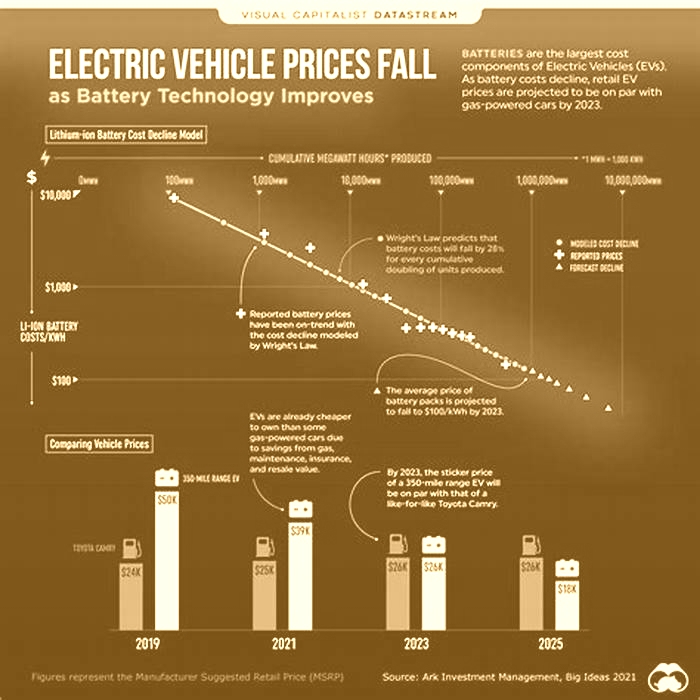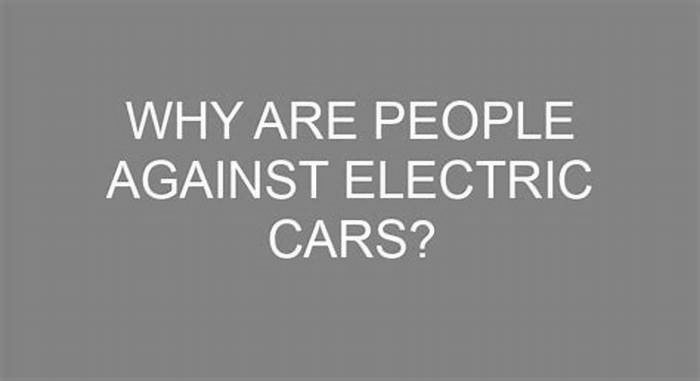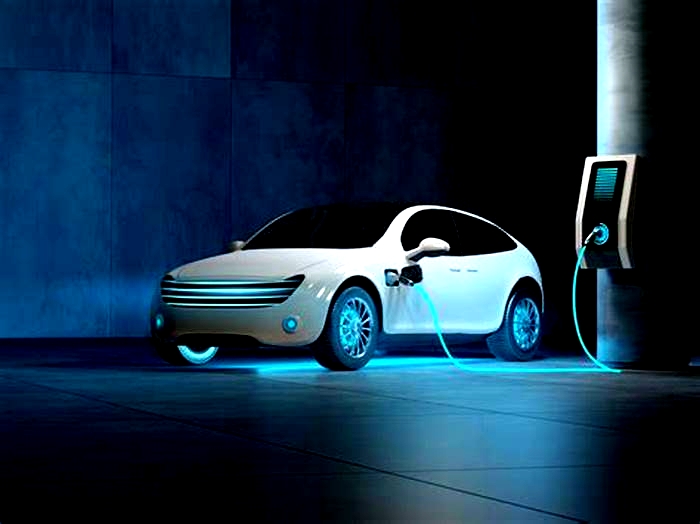Why people don t buy an EV

5 Reasons People Don't Buy EVs
Got EV envy? Is that Tesla taunting you to bust out your wallet? Perhaps a Nissan Leaf is begging you to take a second look. EVs are all the rage, and they have significant benefits over gasoline-powered cars. So, whats holding you back?
For many consumers, there are a handful of reasons why electric vehicles can be a tough sell. Weve got the five biggest misconceptions (and mythbuster answers) about these eco-friendly rides.
Myth #1:EVs Cant Go Very Fast
This is pretty much bunk. Electric cars are actually quicker to accelerate than traditional cars, thanks to an EVs ability to generate torque (the thing that gives a car its ability to go forward), so it can accelerate faster than a traditional car.
That being said, a gas-only powered vehicle can often have a higher top speed, but it really depends on the make and model of the car. For example, EVs such as the Audi e-tron, Jaguar I-Pace, and the Ford Mustang Mach-E electric SUV have a top speed of a whopping 124 mph. And Audis 2022 e-tron GT clocks in at a staggering 154 mph.
The more affordable and popular NissanLeaf takes just 8.4 seconds to hit 60 mph and has a top speed of 98 miles per hour. So, clearly, EVs have some good get up and go.
Gasoline-powered cars often might have higher top speeds but EVs are actually quicker to accelerate.
Myth #2: EVs Are Dangerous
Lets face it: In this era of distracted driving and road rage, getting behind the wheel of our car, whether EV or gas-powered, carries risk. Lots of it. However, if youre wondering whether EVs themselves are dangerous, the quick answer is: probably not any more than a traditional car.
One of the biggest concerns with EVs is the potential risk of fire. Lithium ion batteries are extremely high voltage, which could jumpstart a potentially dangerous process called thermal runaway. This means the battery has become too hot and is sending heat to its surroundings, resulting in smoke, fire and potentially an explosion. Additionally, some auto industry experts have cited fast charging as potentially raising fire risks but there hasn't been any substantial data to support this theory.
Tesla's second annual Impact Report says electric car fires are rare. In fact, from 2012 to 2020, the was one Tesla fire per 205 million miles traveled versus one car fire per 19 million miles traveled for all other vehicle types.
While it's true that electrical fires can trigger longer-burning fires because of the size of the battery banks in the vehicle, there is plenty of longtime evidence to show that gasoline cars catch on fire as well.
At this time, its too soon to know for sure about concrete fire risks and whether or not they are greater than, less than, or about the same as the risks on traditional gas-powered vehicles.
Myth #3: EVs Are Too Small for a Family
Some folks mistakenly believe that EVs are sporty little rides geared more toward tech-y commuters in Silicon Valley than soccer moms in the suburbs. There are scores of EVs on the market that are roomy enough for families of all sizes, including the Kia Niro EV, Nissan Leaf, and Chevy Bolt, all of which seat 5.
EVs on the market today also boast tons of family-friendly technology, like infotainment systems with smartphone integration, and USB charging ports. Add in the typical frunk and EVs evencome out roomier most of the time as well.
Too small for an average family? Nah.
EV sizes are increasing. Seven-seater EVs are in development now and a school district in San Diego County has begun replacing diesel-powered school buses with electric buses.
Myth #4 Charging an EV Is Too Expensive, Takes Too Long, or Is Too Much Hassle
OK, so there may be a little bit of a learning curve when it comes to charging an EV. Yes, you need to charge it on a regular, if not daily, basis. Yes, it can take a little time, and yes, it can be a hasslebut only if you dont understand whats required of you as the owner of an electric vehicle.
Once you understand the basics, however, its not any more of a hassle than waiting in line at the nearest Chevron station, waiting to gas up.
Lets tackle the expensive to charge argument first. The Alternative Fuels Data Center explains the cost like this: If electricity costs $0.13 per kilowatt-hours (kWh) and the vehicle consumes 33 kWh to travel 100 miles, the cost per mile is about $0.04.
If electricity costs $0.13 per kilowatt-hour, charging an EV with a 200-mile range (assuming a fully depleted 66 kWh battery) will cost about $9 to reach a full charge. That doesnt seem like much to fully recharge, especially with the national gas price hovering around $3.15 per gallon this summer.
So, yes . . . it can take time to charge an EV at home but if youre sleeping while it happens, who cares?
As for the time it takes to charge? Well, that depends on the type of charging unit youre using. A fast charger can fill most EV batteries to about 80% in less than 60 minutes, but that can add wear and tear to your battery, so its recommended you only do that when on long road trips. Its an option, though, which means the old fears of cant charge an EV fast are out the door.
Its a better idea to get in the habit of charging your car overnight, using your at-home charger.
If you think you need to reach 100 percent after every charge, you dont. In fact, according to a 2020 University of Michigan study looking at the best ways to preserve battery life, a lithium ion battery shouldnt drain to below 20 per cent or charge past 80 per cent.
Myth #5 EVs Arent Reliable
This myth has been around since the first electric vehicles appeared on the market. There really isnt much difference between gas-powered cars and EVs when it comes to reliability.
Data from sources like Consumer Reports shows that EVs in the $35,000-$45,000 range have a much higher reliability rating than luxury electric cars in the $75,000 and up range. Part of the reason EVs should be more reliable than traditional cars is the simple fact that they have fewer moving parts and arent as complex, but automakers just dont have as much experience with EVs as they do with traditional vehicles. Plus, the technology is still new and evolving.
While its true an EV battery can fail, most automakers have an 8 to 10-year or 100,000 miles warranty on their batteries.
Also, dont confuse reliability with lack of preparation: you need to charge your EV regularly (most recommended overnight, every night) to ensure it will take you to all the places you want to go.
Do your research, scope out the EV you want, and enjoy all the perks that come with driving an electric car.
Thanks for letting us know!
Get the Latest Tech News Delivered Every Day
SubscribeTell us why!
Study: Two-thirds of Americans don't want an EV yet, and half won't pay extra for electrified
Most Americans still aren't ready to buy an EV, according to the Deloitte 2022 Global Automotive Study, which examines consumer perceptions of electrification and other technology movements in the auto industry.
More than two-thirds (69%) of Americans said their next vehicle won't have any kind of electrification, while only 5% saw their next vehicle being an EV, according to the study, which was conducted globally via email questionnaire. In comparison, 17% said they could see a hybrid as their next car.
The majority of consumers surveyed in Southeast Asia, China, and India also said their next vehicle would have no electrification, as did 49% of German respondents. Just 39% of Japanese respondents and 37% of South Korean respondents agreed with that sentiment, with rest anticipating their next vehicle would be a hybrid, plug-in hybrid, or all-electric car.
Global consumer powertrain preferences for their next vehicle (from Deloitte study)
The lack of interest in EVs among United States consumers is due to both cost and range concerns, the study found.
Range was the top concern among U.S. respondents, according to the study. Those respondents also said they expected an EV to travel 500 miles on a charge, something only recently achieved by the Lucid Air, in a version that starts at $139,000.
More than half of U.S. respondents (53%) also said they didn't want to pay more for alternative powertrains. While tax credits and other incentives help, EVs can still carry a price premium over comparable internal-combustion vehicles.
2022 Toyota Prius Nightshade
The Deloitte study offers very different results from a 2020 Consumer Reports survey, which found that seven out of 10 Americans saw an EV in their future, albeit with only 4% saying they actively planned to purchase an EV as their next car.
The range figure produced by the Deloitte study is particularly surprising. Research from Autolist in 2017 pegged 300 miles as a sweet spot for EVs, although AAA noted in October 2020 that Americans were expecting more EV range than they did before the pandemic.
A number of brands plan to go mostly or fully electric by 2030. Yet given these study results, is Toyota's conservative plan, with hybrid tech standard on more models and 85% of U.S. new vehicles from the brand still using tailpipes by 2030, closer to the future outlook?
EV Sales Are in a Slump Why Arent More Car Buyers Going Electric?
The EV revolution is losing momentum: After electric car sales soared in 2022, interest among buyers has underwhelmed and plans for a rapid transition away from gas-powered cars could be in jeopardy.
While the EV market has grown in 2023, sales aren't rising as fast as expected, even with new model launches and price cuts and generous tax credits lowering costs for buyers. Automakers are taking notice and acting accordingly.
In just the last few weeks, EV leader Tesla slashed its prices once again; Ford reduced production of its F-150 Lightning electric pickup truck and postponed $12 billion of EV spending; Mercedes-Benz CFO Harald Wilhelm described the EV market as a brutal space as the company continues to discount vehicles; General Motors delayed three model launches and backed off a public goal of producing 400,000 EVs by the middle of next year; and Honda announced it was ending plans with GM to jointly develop affordable EVs.
Over at Toyota, which has prioritized hybrids over EVs, Chairman Akio Toyoda told reporters that people are finally seeing reality. Despite EV tax credits of up to $7,500, fewer Americans are ready to switch to EVs than automakers or government officials thought.
Ads by Money. We may be compensated if you click this ad.AdAutomakers losing money on EVs
In the U.S., the days' supply for new EVs has doubled since last year to 88 days, meaning thats how long it would take for the current inventory of vehicles to sell at the current sales rate, Pat Ryan, CEO of AI car shopping app CoPilot, told Money. For reference, the average days' supply for gas-powered cars is 59 days, which is basically normal by historic standards.
Traditional automakers overestimated the current demand levels for EVs and are building more vehicles than they currently need, Ryan said. At the same time, the traditional automakers are losing money as they venture into EVs.
Automakers are being forced to lower their EV prices to attract customers and compete with Tesla. But this approach is especially painful because they're already losing money on their EV investments. Ford, for example, lost about $36,000 for every EV it sold last quarter.
According to Cox Automotive, automakers have plans for 150 new electric models between 2023 and 2026, but those goals are complicated by lower-than-expected demand and the tough price environment.
As EV technology improves, Jessica Stafford, senior vice president consumer solutions at Cox, expects the fuel savings and environmental benefits to motivate Americans to buy them.
"It may appear that the EV revolution is slowing down, but our data doesnt corroborate that," she says, noting that EV sales have increased 12 quarters in a row. "Automakers are not stalling on EVs, but instead, adjusting to a pace that is more sustainable for efficient growth without over-saturating the market."
Why Americans arent buying electric cars
Electric vehicles used to be in hot demand because supply was limited and early adopters were eager to try the new tech or shift to more environmentally-friendly transportation. These enthusiasts were often willing to pay luxury prices for their EVs.
But for automakers to capture the mass market, EVs have to outcompete gas-powered on cost and quality. When gas prices are high, it makes more sense for buyers to consider switching to an electric car. Gas prices have been fairly low in 2023 they're currently down around 30 cents per gallon compared to a year ago, on average nationally so there's less incentive to go electric.
According to experts, here are some of the big reasons the demand for EVs isn't as high as some want it to be:
- EVs are too expensive: Joseph McCabe, president of AutoForecast Solutions, says vehicle cost is the No. 1 barrier to EV adoption. EVs usually cost at least $10,000 more than their comparable gas counterparts, he says.
- Charging is expensive: If you can charge your EV at home, there are considerable fuel savings that come with going electric: Youd spend about 3x more on gas than the cost of home charging. However, the costs are about the same if youre using a public charger, and getting fuel at a gas station is much more reliable and less time-consuming.
- Charging is inconvenient: Fast chargers are still hard to find in many more remote parts of the country. According to AAA, 56% of people say the lack of convenient charging is a top reason for not going electric.
- Depreciation: The average used EV price dropped nearly 20% in the past year, according to iSeeCars.com. Potential EV buyers have good reason to worry their cars wont hold their value well as the technology improves. The used market is not as strong for electric vehicles, and as a result the depreciation is higher, says Greg Brannon, director of automotive engineering research at AAA. That's your single biggest operating expense.
- Range anxiety: Some high-end EVs promise 300+ miles of range on a single charge, but even that is not enough to cover a common drive like San Francisco to Los Angeles. Youd have to take a charging break, potentially adding 30 minutes or an hour to an already long drive.
- Hybrids are more popular: According to Adam Ragozzino, principal analyst, batteries and electric powertrains at Wards Intelligence, Tesla isnt the best-selling electrified vehicle brand in the U.S. Its Toyota, which has over 20 hybrid models and is focused on these cars in the near term, given that they offer good fuel efficiency and are capable of making long trips without requiring charging breaks. Hybrids are not only more practical and familiar to drivers than EVs, they also tend to be cheaper.
Whats next for EVs
Auto experts are increasingly skeptical that the U.S. will be able meet a 2032 target essentially requiring 67% of new cars to be EVs. Right now, the current EV market share in the U.S. is just 7.9%, according to Cox. Automakers are already adjusting their own goals, and it's possible that more EV model launches will be delayed in the coming months.
Ragozzino says the government's goals won't be possible unless automakers make major progress on charging infrastructure and bringing down production costs to the point where they can price their EVs on par with gas and hybrid cars.
Ryan agrees that automakers can't justify scaling up their production with the levels of demand among buyers today.
"Moving forward, it will remain very challenging for the traditional automakers to make meaningful inroads on their EV commitments," he says.
Newsletter Every day we publish the latest news, stories, and content on the financial topics that matter. This is your daily guide to all things personal finance.
More from Money:
8 Best Car Loan Rates of 2023
Auto Loan Delinquencies Reach a Record High Heres What to Do if You Cant Make a Car Payment
10 Best Auto Refinance Companies of 2023


